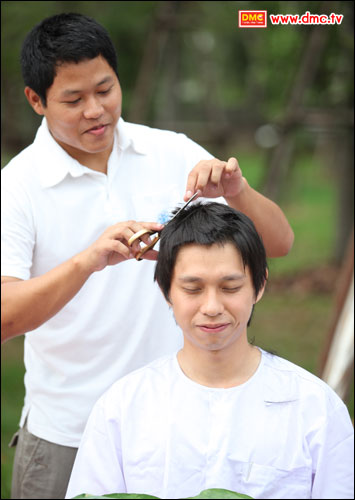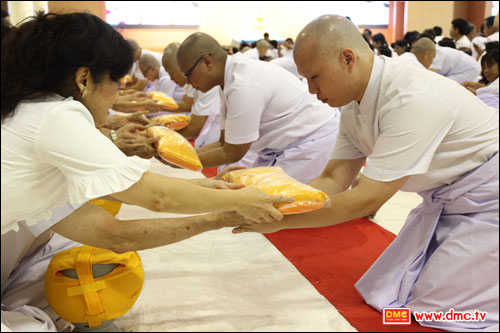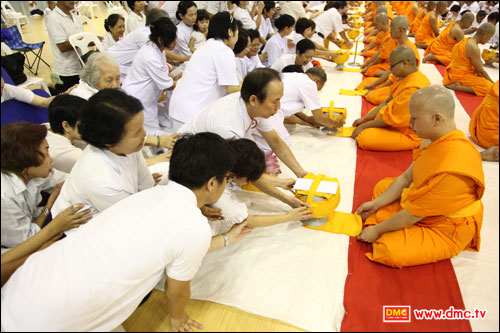Ordaining for One’s Parents Brings Merit
Ordain while your mother is still alive to show her your gratitude.
In this day and age of ever-present temptations and perpetual pressure to make a living, it is especially rare to find any family with a son who ordains as a Buddhist monk for at least the period of Buddhist Lent. The parents must must have accumulated a tremendous amount of virtue. It does not occur often since the first requisite is the willingness of the son. The ordination is not done is exchange for a new car or for monetary gain.
Longing to See Their Son in Saffron Robes
The writer is looking at a poster put out by the Buddhist Society inviting students to ordain during their summer vacation. The poster shows a mother about sixty years old. She is holding a small lei in her hands; her face is full of joy. Her son, attired in white novice robes, in bowing low at her feet showing deep love and respect for her, and symbolically asking for permission to ordain.
The caption says, “Ordain while your mother is still alive to show her your gratitude.”
Any mother who sees this poster will wish that her son will ordain at least once. And any son who sees it will be very motivated to ordain.
The writer has ordained for a number of Buddhist Lents, and I can attest that the joy of ordination is limitless. I have learned that we can be happy without worldly possessions, a space of one square meter for sitting and standing, and two square meters for sleeping. These can give more happiness than millions of Baht. This kind of happiness cannot be bought.
Moreover, it was a double benefit. Initially, my ordination was to show gratitude to my parents. Auspicionsly. I discovered the purpose of life.
Ordaining for One’s Parents Brings Merit
Obstacles to Ordination
To ordain and to give one’s parents the chance to rejoice in the merits do not occur easily. Ordination is not something that one can do whenever one wants to. Ordination requires merits accumulated from one’s past life, as well as meeting all the qualifications set out in the discipline section of the Tripitaka.
Unfortunately, my father passed away when I was small, so he did not get to see his son in the saffron robes. And I had had two close calls, which almost took my life before my father. The first time was when I was a little over ten years old. As I was daydreaming and pretending to be a sword fighter in a Chinese martial arts movie, I did not see a motorcycle coming because the hat I was wearing was blocking my view. Fortunately, the motorcycle was coming at a slow speed. I was knocked over, but was able to get up and walked away with minor injuries. That was my first brush with death.
The second time was when my appendix burst during the night. I was taken to the hospital by my mother and grandmother. However, the doctor did not diagnose me correctly. If there had been an internal infection, my family would be making arrangements for my funeral. I suffered for 15 hours while the doctor treated me for a normal stomachache. Once he found out that my appendix had ruptured, I was immediately operated on.
When I came around from the anesthesia the next morning. Still groggy, I saw the fellow in the next bed who had suffered the same case. But he must have it a lot worst than mine because I saw tubes still draining toxin out of him. I felt lucky. When I turned around, I saw the faces of two elderly ladies with expressions of enormous relief. I thought, “My mother and grandmother must have been here all night watching over me.”
I felt right there that these two ladies must have loved me very much. They were the ones who loved me with all their hearts; it was an unselfish love which expected nothing in return. I asked myself if I had done anything to repay their love.
And the answer is…very little. I realized right there that I must not do anything to hurt them if I could help it.
These two close shaves played a major part in spurring me to ordain. I wanted my mother and grandmother to see me in the saffron robes. I wanted to give them the chance to accumulate merits, and I wanted them not to worry about me any longer since I would be educated in Dhamma.
We are Walking to Our Graves
I decided t ordain after I finished college. When I looked at life, everything seems so unpredictable. We might see someone in the morning, but by the evening, he could be dead.
I have seen parents make funeral arrangements for their children, grandparents for their grandchildren. It should not be this way, and I certainly did not want this to happen to me. But since life is so unpredictable, the priority was ordination. Besides, my mother’s health was deteriorating; my grandmother was getting very senile, and if I delayed the ordination any longer, they might be too weak to know. I should do it as soon as possible.
And then my decision was swayed. Upon graduation, I was offered a very good job, the workload consumed me, and thoughts of ordination were pushed aside. I must have been my past merit coning to help me, for one day, the senior monk who know about my earlier intention came to guide me.
His first words were, “How about ordaining this coming rain retreat?”
I hesitated for a while, but finally said, “I still have a lot of assignments on hand, I don’t think I should leave now.”
I hesitated for a while, but finally said, “I still have a lot of assignments on hand, I don’t think I should leave now.”
As if he had expected my answer, he retorted, “if you die today, your bosses are not going to care enough to forward you any merit.”
His reply was like lightning in the dark. It jolted me to think that if I died today, my mother and grandmother would be the only ones who would care enough to share their merits with me. Once this thought flashed in my head, I instantly resolved to ordain during the rain retreat.
Ordaining for Loved Ones
Merits from Ordination
After my ordination, I learned that Thai people believed that ordination is repaying one’s debt of gratitude t one’s parents. Yet there were still quite a few Thais who did not subscribe to this conviction. How could a son be repaying his parents when he was accepting offerings by himself and performing various virtuous tasks, while his parents were at home? It looked more like he had deserted them. Someone had asked the senior monk the same question, and this was how he explained it.
“Everybody has his own beliefs, but before you believe in anything, you should look at the logic behind it. In Buddhism, we believe that ‘whoever performs good deeds will receive good outcomes, and vice versa. We reap what we have planted.’
“When a son is ordained, certainly he will receive the merit for trying to purify himself according to the Lord Buddha’s teachings. The parents receive a different type of merit: first, they will gain merit for supporting his ordination. Secondly, When their son is a monk, out of concern for him, they will go to the temple to offer food, nt only to their son, but other monks as well. Consequently, they will gain merit for generosity. Third, some parents, out of deep concern, will spend more and more time at the temple. While there, they spend more and more time at the temple. While there, they spend more and more time at the temple. While there, they will hear the teachings of the Lord Buddha, making them more informed of right and wrong. In elevating their moral standards, they will gain more merits. And finally, while at the temple, they will see that other people are observing the precepts and practicing meditation. If they follow this example they, too, will gain merit.
“There is no doubt that parents will be gaining merits of a different nature than their son. However, the merit does not come to them automatically if they sit idly by. There are some monks who have to visit their parents at home to convince them to observe the precepts. If they follow his advice, only then will they gain merits.”
Ordaining for Loved Ones
These days, in pursuing their goals in life, most men tend to be moving further away from their parents. If this drift continues, chances of ordaining for their mother or father will be slim. To avoid this conflict, we should ordain for our parents unconditionally to reciprocate their absolute love for us.
If we take a good look at people’s lives, we will see that we have worked hard for other people, some even harder than we have ever worked for our own people, some even harder than we have ever worked for our own parents. If we can give that much to others, why are we unable to give more to our own parents?
This summer will be the ideal time to do it. As a Buddhist scholar wisely put it, “Every man should be an intellectual in secular affairs, and a sage in Buddhism, so his life will not be wasted.”
Meditation - Related Articles
" />
" />
" />
" />
" />
" />
" />
" />
" />
" />
" />
" />








